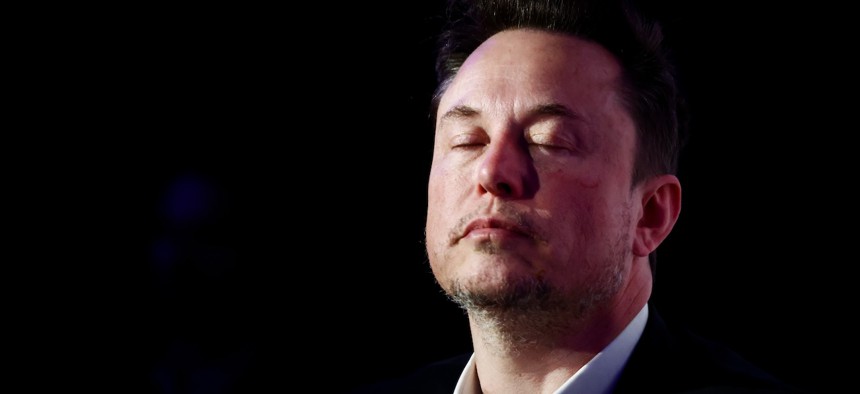
NurPhoto/Getty Images
Elon Musk and why you should never compare when it comes to security clearances
COMMENTARY | The government looks holistically at the benefits and risks to national security with each clearance granted.
News reports over the past month have speculated as to whether billionaire entrepreneur Elon Musk is using illicit drugs. The CEO’s security clearance and NASA contracts were called into question in 2018 due to Musk’s use of drugs on comedian Joe Rogan’s show. Following that incident, Musk claims he submitted to random drug testing at the request of the government.
Musk has pushed back against the drug claims, but many in the national security space have speculated how the CEO is able to maintain clearance eligibility despite the ongoing drug speculation. The case is certainly exceptional – as anything involving the world’s richest man would be – but also representative of a clearance reality. Security clearance eligibility is truly granted on a case-by-case basis, and when it comes to comparing yourself to anyone’s clearance story, you’d best tread carefully.
In addition to his 2018 drug use, Musk has also admitted to using Ketamine, for which he claims to have a prescription. Prescription drug misuse is certainly a rising clearance problem, but Ketamine use under the advisement of a physician is allowable for security clearance holders. When it comes to drugs, it is very much a case of ensuring whatever you use is prescribed or under the advisement of a physician. If it is, and it’s not a drug that’s illegal at the federal level, it’s not necessarily a clearance issue.
Musk isn’t the first person to be able to do drugs while holding a security clearance and maintain eligibility. The growing legalization of drugs at the state level, decriminalization in many others, and widespread use mean a growing number of security clearance applicants and holders find themselves ignorant to the law and how it applies to their clearance eligibility. Whether it’s misuse of a prescription drug or taking a toke at a party, drug use while holding a security clearance is a cause for a clearance denial, but may not necessarily result in revocation.
If you find yourself doing something you shouldn’t, fortunately there are steps that can be taken to ensure you can obtain or maintain eligibility as the government keeps a more watchful eye.
Conditional security clearances exist to ensure the Super Secret Squirrels who have incredibly valuable knowledge and usefulness to the government can continue to be useful, despite flaws. A conditional clearance occurs when the government realizes you have some red flag issues – whether they’re substance related, financial circumstances, or a recent life issue. Drug and alcohol cases are often some of the most straightforward for the government to address with a conditional clearance – applicants or clearance holders can agree to regular drug or alcohol screening or submit to a counseling or treatment program, and the government can see that as a proactive step to help ensure it has access to the talent it needs while mitigating the potential clearance issue.
The security clearance process is all about risk mitigation – the government is looking to decide if the benefits to national security are worth the risks of any negative behavior you might take. Clearances are truly granted on a case-by-case basis, taking advantage of the “whole person concept.” A single incident or issue – even a failed polygraph – should not result in security clearance denial or revocation. The government considers all aspects of your character and also your value to the government.
In the case of Musk, it is clear the government has decided the benefits of his maintaining eligibility are worth the risks. It’s an easier case to make when you’re creating groundbreaking technology and helping get humans to Mars. It may be a harder case for you to make if your name is Joe and your job is to get a truck to the naval yard. The government is truly looking holistically at the benefits and risks to national security with each clearance granted. It’s why the process is so important – but also so cumbersome.
That may seem like a double standard, but that’s if you forget that there is no universal standard. There are adjudicative guidelines, but those guidelines are applied to people. The government can grant eligibility, but also protect access. Just because an individual has a security clearance doesn’t mean they get read into any classified program, or have access to every state secret. Conditional clearances and waivers exist to ensure everyone – including the Elon Musks – can maintain clearance eligibility and the government can create parameters for that eligibility.
The security clearance process is about risk mitigation and weighing the scales of national security and information protection. If you have the Secret Squirrel Sauce (and you're a billionaire rocket maker), I think the government will try to find a way to ensure you can keep contributing to national security and work to mitigate any risks.






